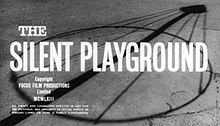fiction.wikisort.org - Movie
The Silent Playground is a 1963 British thriller film written and directed by Stanley Goulder.[2][3]
| The Silent Playground | |
|---|---|
 | |
| Directed by | Stanley Goulder |
| Written by | Stanley Goulder |
| Produced by | George Mills |
| Starring | Roland Curram Bernard Archard Jean Anderson Ellen McIntosh |
| Cinematography | Martin Curtis |
| Edited by | Peter Musgrave |
| Music by | Tristram Cary |
Production company | Focus Film Productions |
| Distributed by | British Lion (UK) |
Release date |
|
Running time | 75 minutes[1] |
| Country | United Kingdom |
| Language | English |
Production
The film was shot on location in 24 days for $75,000 by debut feature director Goulder, who had previously made documentaries.[1][4]
Plot premise
In London's Greenwich, just before Christmas, Mavis Nugent (Ellen McIntosh), a young widow, drops her children outside the cinema for Saturday morning pictures so she can go to work at a local haberdashers. A man approaches the queue and gives out handfuls of what the children take to be sweets. At the end of the performance, staff find several of the children unconscious with barbiturate poisoning. A police investigation begins, led by Inspector Duffy (Bernard Archard.) When one of the children blacks out in the street later, his friend is able to show the police two types of capsules. At the hospital, Dr Green (Desmond Llewelyn) and his nurses fight to save the children. After his mother realises her adult son does not have all of the mental health medication that had been dispensed to him that morning, the hunt shifts to a nervous and vulnerable hospital outpatient, Simon Lacey (Roland Curram), who had been unwittingly handing out the pills. The police are able to apprehend the man, but not before he has thrown away the rest of the drugs in a playground where small children are playing. Meanwhile police search for Mrs Nugent and her three children.
Cast
- Bernard Archard as Insp. Duffy
- Jean Anderson as Mrs. Lacey
- Roland Curram as Simon Lacey
- Ellen McIntosh as Mavis Nugent
- John Ronane as Alan
- Desmond Llewelyn as Dr. Green
- Rowena Gregory as Jane Wilson
- Basil Beale as Sgt. Clark
- Cheryl Molineaux as Ruby
- Michael Byrne as Roger
- Malya Nappi as Mrs. Rosati
- Margaret Flint as Mrs. Fairgrove (as Maggie Flint)
- Mollie Maureen as Mrs. McCarthy
- Gretchen Franklin as Mrs. Elgin
- Barbara Miller as Mrs. Heatherley
- Christine Ozanne as Mrs. Briggs
- Anna Turner as Mrs. Ward
- Rickford Harris as Johnny
- Aileen Harte as Mrs. Nesbitt
- Donald Tandy as Hospital porter
- Anthony Marshall as Infirmary child
- Margaret Durnell as Matron
- Victor Charrington as Sgt. in sub-station
- J. Mark Roberts as P.C. in sub-station
- Peter Wells as Ted
- Joe Wadham as Duffy's driver
- Edward Dentith as Cinema manager
Reception
It was a commercial disappointment.[5]
Critical
Variety wrote "this is quality production...[Goulder's] screenplay is taut, economic and natural in dialog and his direction is unfussy and alert."[1] and TV Guide wrote "The story never panders to its more-sensational elements but is, instead, an intelligent and sensitive thriller."[6]
References
- "The Silent Playground". Variety. 1 January 1964.
- "Watch The Silent Playground". BFI Player.
- "The Silent Playground (1964)". BFI.
- "Stanley Goulder". BFI.
- Petrie, Duncan James (2017). "Bryanston Films : An Experiment in Cooperative Independent Production and Distribution" (PDF). Historical Journal of Film, Radio and Television: 12. ISSN 1465-3451.
- "The Silent Playground | TV Guide". TVGuide.com.
External links
- Review at Variety
- Silent Playground at IMDb
Другой контент может иметь иную лицензию. Перед использованием материалов сайта WikiSort.org внимательно изучите правила лицензирования конкретных элементов наполнения сайта.
WikiSort.org - проект по пересортировке и дополнению контента Википедии